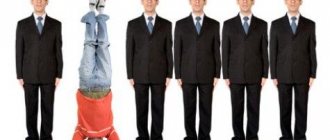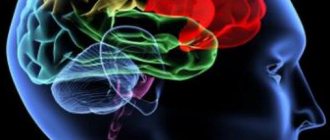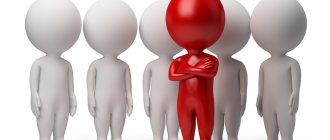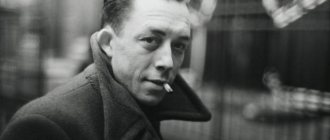Personal abilities are features of the subject’s psyche that affect the success of acquiring skills, knowledge, and abilities. However, the abilities themselves are not limited to the presence of such abilities, signs and skills. In other words, a person’s ability is a unique opportunity for acquiring skills and knowledge. Abilities are manifested only in such activities, the implementation of which is impossible without their presence. They are not found in skills, knowledge and abilities, but in the process of their acquisition and are part of the personality structure. Every person has abilities. They are formed in the process of the subject’s life activity and change together with changes in life’s objective circumstances.
Development of personality abilities
Abilities in the personality structure are its potential. The structural structure of abilities depends on the development of personality. There are two degrees of ability formation: creative and reproductive. At the reproductive stage of development, the individual shows significant ability to master knowledge, activities and implement them according to an explicit model. At the creative stage, an individual is able to create something new and unique. The combination of outstanding abilities that determine the very successful, original and independent performance of various activities is called talent. Genius is the highest level of talent. Geniuses are those who can create something new in society, literature, science, art, etc. The abilities of subjects are inextricably linked with inclinations.
A person’s abilities for mechanical memorization, sensation, emotional excitability, temperament, and psychomotor skills are formed on the basis of inclinations. The possibilities for the development of anatomical and physiological properties of the psyche, which are determined by heredity, are called inclinations. The development of inclinations depends on close interaction with surrounding circumstances, conditions and the environment as a whole.
There are no people who are completely incapable of anything. The main thing is to help the individual find his calling, discover opportunities and develop abilities. Every healthy person has all the necessary general abilities for learning and those abilities that develop during certain activities - special ones. So, the main factor influencing the development of abilities is activity. But in order for abilities to develop, activity in itself is not enough; certain conditions are also needed.
Abilities need to be developed from childhood. In children, engaging in any particular type of activity should evoke positive, constant and strong emotions. Those. such activities should bring joy. Children should feel satisfied with their activities, which will lead to the formation of a desire to continue to engage in further activities without coercion from adults.
Creative expression of activity is important in the development of children’s abilities. So, for example, if a child is passionate about literature, then in order to develop his abilities, it is necessary that he constantly writes essays, works, albeit small ones, with their subsequent analysis. A huge role in the development of the abilities of younger schoolchildren is played by visiting various clubs and sections. A child should not be forced to do things that were interesting to parents in their childhood.
The child’s activities should be organized so that they pursue goals that are slightly beyond his capabilities. If children have already shown abilities for something, then the tasks given to them should gradually be made more difficult. It is imperative to develop in children, along with abilities, self-demandingness, determination, perseverance in the desire to overcome difficulties and criticality in judging their actions and themselves. At the same time, it is necessary to form in children the right attitude towards their abilities, achievements and successes.
The most important thing in developing abilities at an early age is a sincere interest in your baby. It is necessary to pay as much attention to your child as possible and do some work with him.
The decisive criterion for the development of society is the embodiment of the abilities of individuals.
Each subject is individual, and his abilities reflect the individual’s character, passion and inclination towards something. However, the realization of abilities directly depends on desire, regular training and constant improvement in any specific areas. If an individual lacks passion or desire for something, then it is impossible to develop abilities.
Psychology of creativity
Freedom is expressed in creativity.
Sergei Nikolaevich Bulgakov
The psychology of creativity is a branch of psychology that studies the creation by man of everything new and original in a variety of fields of activity.
We can talk about new scientific discoveries, inventions, art, technology, and in general about bringing something new into our everyday life. The psychology of creativity also studies the structure and development of human creative potential. It is believed that this section is one of the most difficult in psychology, since the criteria of novelty and originality are very vague and ambiguous. On the one hand, everything in our life is new and unique in its own way, therefore life itself is creativity. You will not find absolutely identical people in this world, just as you will not find things done in the same way by them. The actions, words, ideas of different people are not similar to each other. But on the other hand, there are such things, such, let’s say, human creations, that are very different from everything else that exists in this world. And some talented people continue to change our lives with the help of such creations. Therefore, we can say that everything that is very new and very original is exactly what we call a product of creative labor. And I want to tell you, dear readers, that creativity in itself is a very strong side of a person. Creativity is our great gift! And in this article I will tell you how to use this gift and what benefits can be derived from the psychology of creativity. The first thing I would like to say within the framework of this topic is that creativity must be taken seriously, since it is a very powerful tool in the hands of a person, on which in the future our life will depend even more than it depends today and depended on in the past. past. And in order to take creativity seriously, it must be understood correctly. This is exactly what the psychology of creativity allows us to do. All people are creators by nature, but not all of them create, although each of us constantly does something, in our own way, uniquely, in the way we know how. But we only recognize creativity that, firstly, as mentioned above, offers us something very new, and secondly, brings some kind of, even aesthetic, benefit to society. Everything that gives rise to new thoughts and new images in our head, and at the same time is useful for us, even if only from our subjective point of view, we define as creativity.
At the same time, you and I must understand that a creative approach is applicable to all areas of life, and something new, original, unusual does not necessarily have to relate to any specific type of activity, for example, art. Even in routine work there is a place for novelty and originality, which often leads to progress and increased efficiency of work, and therefore to higher returns from this work. When a person finds new solutions to old problems and thereby solves them more effectively, this is a positive example of a creative approach to work and life. A person is capable of this, that’s what’s amazing. This is our feature that the psychology of creativity studies - our ability to create, to go beyond the known, to invent something new. But, say, a computer that works according to an algorithm and cannot deviate from it is not capable of such things, at least for now.
Since we, people for the most part, are practical, life forces us to be like this, we want to know something, not for the sake of knowledge itself, but in order to use this knowledge to solve specific problems and tasks and to improve our lives . Therefore, we must approach creativity from a practical side in order to understand in what area it can be used, and exactly how this can be done. So, you can use your creative abilities in absolutely everything, from your work to your personal life. As I already said, a creative approach to life is a prerequisite for a successful person of tomorrow, so you need to look for something new in everything. And in order to find this new thing, we need to move away from the old approach to life, when we acquired some knowledge, some schemes, some algorithms, and then used them throughout almost our entire lives. In other words, the old model of education that many of us use in our lives is becoming obsolete. Now, roughly speaking, knowledge does not need to be obtained - it needs to be created, invented. A creative person is not a robot, not a machine, not a mechanism, not a cog in the system - he is a personality. But this is not just a personality, this is not even an unusual personality - this is a discoverer, this is a dreamer, this is, to some extent, a very risky person, and in a sense, even a pioneer. After all, most people are accustomed to living according to a template, according to a pre-learned scheme, according to a certain program, when you don’t need to think at all - you just need to follow other people’s instructions and instructions, or, as I already said, be guided by previously acquired knowledge. This approach to life is still appropriate, and there are plenty of people who are not used to it, and therefore do not know how to think with their own heads. But the world is changing, it has long since begun to change, relying on creative individuals, on individuality, and now this process has accelerated - and these creative individuals, capable of creating something new and thanks to this conquering everyone else, are no longer an exception - on such people, on This approach to life is the focus of the progressive part of humanity.
So, returning to the psychology of creativity, I want to say that with its help, friends, you can make yourself a person of tomorrow, that is, an independent, creative person who can and, most importantly, wants to think with his own head in order to come up with something something new and implement this new thing into life. Human-mechanisms will soon be replaced by machines, robots, automata, computer programs, while people, whose main advantage will be their brains, with the help of which they can create, create something new, more advanced, will greatly increase in price. Life does not stand still, and if, relatively speaking, yesterday it was possible with the existing store of knowledge to worthily go through your entire life’s path, today this luggage must be constantly replenished and updated, getting rid of everything old and ineffective. For some of you, this may not be so important, because, in the end, it is the youth who have to think more about how to live in tomorrow's world. But no matter who you are, no matter where you work and no matter how old you are, you must agree that a creative approach to life greatly simplifies it and makes it more interesting. After all, how often do we find ourselves in situations that we perceive as dead ends, from which there is no way out, whereas in reality, we simply know about it, or rather, we cannot think of one. So, creative thinking, a creative approach to life can lead us out of any dead end. Therefore, the deeper you dive into this topic - into the topic of human creative abilities, including through the study of the psychology of creativity - the more opportunities you will have to improve yourself.
Many people, according to my and not only my observations, have problems with creativity, in terms of realizing their creative ideas. Good, interesting, bright ideas come into their heads, ideas that can change a lot in their lives and in life in general if they implement them. But people are afraid to do this. They doubt themselves, their capabilities, they are afraid of being ridiculed, they are afraid that someone has already come up with something better or that their ideas are worse than other people's ideas, and so on and so forth. In other words, due to self-doubt and low self-esteem, people are afraid to create. This is a very big mistake, this is generally a problem and a very serious one for people, which, by the way, the psychology of creativity can solve. More precisely, a good psychologist is able to rid a person of those internal inhibitors that cause this problem. After all, this is a psychological problem. And it should be solved by overcoming fear. There should be no fear, because fear kills creativity. Creativity requires freedom and independence, as well as courage and self-confidence, otherwise even the brightest thoughts will simply flare up and go out, leaving nothing behind. Therefore, there is no need to be afraid of anyone or anything. Do not pay attention to the opinions of other people, especially the opinions of those who do nothing themselves but only criticize others. There will always be critics and they will always criticize you, no matter what you do and no matter how good or bad you do it. You will always be criticized for everything, even if you do nothing at all, and even more so for something that will be completely new to most people. People are afraid of new things and do not like those who stand out from the rest. And creativity, of course, sets us apart, it makes us special and unique, it makes us an individual. Fortunately, in the modern world they are not punished for this, as they did before, although they can be criticized, and in the near future, creative people will become worth their weight in gold. So be creative and don’t be afraid of anything. Yes, creativity is a certain risk, but this is life, you know. You live when you create, and don’t just go with the flow like an empty log. And when you live, truly live, you are responsible for your life. And this, you see, is a little scary. It is impossible to live and create without risk, but you must love this risk and understand the fear, then the world will submit to you.
Man is by nature a creator, and by studying creativity and creative processes, the psychology of creativity gets to the bottom of the divine essence of man, to those of his innate qualities that not only distinguish him from animals, but also distinguish each individual person from other people. Just as there are no identical fingerprints and retinas, there are no identical human creations, each of which enriches and most often improves this world. And creativity makes a person free. By being carried away by the psychology of creativity, you, my friends, can make yourself free people, regardless of the position you occupy in society. Creativity, as I have already said, requires freedom, it requires freedom in the soul and head of a person, so if you create, if you try to create, if you strive to create, you free your soul from the shackles in which society has imprisoned it. A creative person who strives to realize himself through creativity feels free. And to feel free, and even more so to feel and be a free person, is great happiness. Many people are unhappy precisely because they do not feel free - they have been made into automata, who spend their days engaged in unnecessary and often completely meaningless activities just to maintain themselves in a “alive” state and have a certain standard of living. But this is not life - this is existence. A person does not live when he acts according to a program imposed on him by someone - he lives his life, that is, to some extent, he simply wastes it. And, unfortunately, many people are forced to exist this way, regardless of what job they have, how much money they have and what they can afford. A life that is not full enough cannot be half full, you cannot become happy by simply getting too drunk, filling your house with all sorts of junk and obtaining a certain status in society. A person needs to realize himself through creativity, he needs to emphasize his uniqueness, and not with external attributes, but with the help of his abilities and his creations. It is not things that make a person special, not external attributes, but himself, his inner self.
Anyone, or almost every person, can become a creator and, thanks to creative activity and a creative approach to life, find happiness, I am absolutely sure of this. I have had to help people in this matter more than once. I simply helped them get out of the mechanistic state of mind and begin to live a free life, to create, to be special, unique, not like everyone else. People need this, they want to be special and unique - this is one of their needs. In addition, when a person approaches life creatively, many problems simply cease to exist for him, he begins not so much to live, much less survive, but rather to play a game called life. He gets rid of the fear that oppresses him and begins to enjoy every action, every decision, and every thought. He enjoys it because it is his action, his decision, his thought. A person does not imitate, does not repeat, does not compare himself with anyone, does not strive to be like anyone - he is aware of his Self and realizes it through creativity. At the same time, we are not talking about creating within strictly defined boundaries, say, drawing pictures that no one needs or sculpting sculptures. Everything is much more interesting. As I have already said, creativity needs to be looked at more broadly, or rather, in the process of creation there should not be any framework limiting a person at all, since in reality there are none. Thought must receive freedom in order to develop and improve, then human creative activity will be fruitful and successful. And, I repeat, she has no restrictions. Therefore, you can become a creator at your job, in your business, in your family, you can creatively solve any problems and tasks, or rather, with the help of a creative approach, you can turn any problem into an interesting task for you and solve it with pleasure.
I, friends, respect the psychology of creativity only because it generally studies human creative abilities and even because it generally draws people’s attention to this topic, to this innate human ability. After all, by nature we are all creators and this is our gift, our advantage, our joy. But this gift must be developed, this advantage must be used, this joy must be felt, experienced, experienced, then we will feel happy, so happy that no other worldly pleasures will overshadow our sense of our divine essence.
For me, creativity is an opportunity to live, and not just to live with the body, filling it with food every day so that it works, but to live with the soul, live with the mind, live with all one’s essence. And even my views on life are largely determined by my love for creativity and some kind of ability to create. For example, sometimes they tell me about my colleagues as my competitors with whom I must compete, for example, on the Internet. I, in turn, always reject this point of view on my work, on my activities, on myself as a specialist, and even more so as a person. It is unacceptable for me to compare myself with someone and therefore compete with someone. It's like being in a free field, jostling with other people in one place, trying to occupy it. Why is this necessary - when there is endless space everywhere? I have no competitors and cannot have any in principle, because I am the only one, my activities are not similar to the activities of other people, I do not imitate anyone, I will not repeat after anyone, I do not want to be like anyone. Everything I do in life is unique and inimitable. And people, including my clients, may or may not like me, that’s their business. There are those who like my work, and these, one might say, are my people, and there are those who are not satisfied with something in my work, who, perhaps, do not like me. And I don’t hold them back, I don’t convince them of anything, I don’t drag them to me and I don’t try to change for their sake, because it’s pointless to do it anyway - you’ll never please everyone. It’s just that these are not my people, that’s all. There are other specialists, and perhaps with them these people will feel better, more interesting, perhaps with them their views on life will coincide much more, and they will be useful to each other. Is it bad? This is normal, this is how it should be - we are all different, we should be different, so we are not always suitable for each other. So there can be no talk of any competition; each of us gives to other people what we can give. And each of us takes from other people what he wants and what he can take. Understand this, accept it, and your life will become much easier. And your soul will gain freedom, since it will not feel infringed because of other people. Don't compare yourself to anyone, don't let other people compare you to anyone - be yourself, and it will be great, it's just great happiness to be yourself. There is no need to jostle with other people on the same road, no matter where it leads - go your own way, and then those people who like your path, and you yourself, will go with you.
Now, let's return once again to the question of what can be considered creativity? Friends, decide for yourself. In your life, it is you who must decide what will be creativity, creative activity for you, and what will not. What the hell does it matter who thinks about this and what they think about it? Do you think science should tell you what creativity is? Or other people? No one should tell you what it means to create. You yourself should feel this. A creative person, when he creates something, does not think at all about how unique and new his creation is. He feels good about what he does. He does not state the fact of the creative process - he simply feels it. If you need to solve a problem using a non-standard method, solve it the way you want, most importantly, solve it. And if it later turns out that your method has already been discovered and used by someone, will this become a problem for you? You discovered it for yourself, and that’s the main thing. Well, if you express yourself through creativity, then you don’t have to worry about what other people will think about your activities. After all, it’s one thing to offer something to people so that they accept it; here, of course, you need to be able to impress people with your creativity, and quite another thing to create for yourself, for the soul. It’s better to start with the latter – with the creation of a loved one for yourself. Your main task is not to limit yourself to any boundaries. Your creative abilities will manifest themselves in the best possible way only if you feel free and are not afraid of anything or anyone.
Well, you are probably interested in the question: is it possible to teach a person creativity? Although I have already touched upon it, in the end I will tell you once again that it is possible to bring a person to a state that will contribute to the awakening of his creative abilities with their further development. This is exactly what can be done. I know this because I have done this with different people and with myself many times. But in my opinion, it is impossible to teach a person to create, to create something new, unusual, because you can only teach how to repeat something after someone, while creativity is the birth of something completely new that a person he comes up with it himself, of his own free will, without anyone’s help. But, I repeat, it is possible to bring a person to a state in which his creative abilities can fully reveal themselves. You can also teach a person to change existing ideas and concepts in order to derive something of their own from them. These procedures, in principle, can be called teaching creativity. Well, I hope, dear readers, that having understood the power and, if you like, the benefits of creativity, you will show sufficient interest in this gift of ours and begin to develop it in yourself. And the psychology of creativity, in turn, will help you with this.
Creative abilities of the individual
Many people mistakenly believe that creative abilities include only drawing, writing and music. However, this is absolutely false. Since the development of an individual’s creative abilities is closely interconnected with the individual’s perception of the world as a whole and his sense of himself in it.
The highest function of the psyche, reflecting reality, is creativity. With the help of such abilities, an image of an object that does not exist at that moment or that never existed at all is developed. At an early age, the foundations of creativity are laid in a child, which can manifest themselves in the formation of the ability to conceive and implement it, in the ability to combine their ideas and knowledge, in the sincerity of conveying feelings. The development of children's creative abilities occurs in the process of various activities, for example, games, drawing, modeling, etc.
The individual characteristics of a subject that determine the individual’s success in performing any creative activity are called creative abilities. They represent a combination of many qualities.
Many famous scientific figures in psychology combine creativity with thinking characteristics. Guilford (an American psychologist) believes that creative individuals are characterized by divergent thinking.
People with divergent thinking, when searching for a solution to a problem, do not focus all their efforts on establishing a single correct answer, but look for various solutions in accordance with all possible directions and consider many options. The basis of creative thinking is divergent thinking. Creative thinking is characterized by speed, flexibility, originality and completeness.
A. Luk identifies several types of creative abilities: finding a problem where others do not notice it; collapsing mental activity, while transforming several concepts into one; using the skills that have been acquired in finding solutions from one problem to another; perception of reality as a whole, and not splitting it into parts; ease of finding associations with distant concepts, as well as the ability to provide the necessary information at a certain moment; choose one of the alternative solutions to the problem before checking it; show flexibility of thinking; introduce new information into an existing knowledge system; see things and objects as they really are; highlight what is noticed from what the interpretation offers; creative imagination; easy to generate ideas; refining specific details to optimize and improve the original idea.
Sinelnikov and Kudryavtsev identified two universal creative abilities that developed in the process of historical development of society: realism of imagination and the ability to see the integrity of a picture before its component parts. Imaginative, objective grasping of some significant, general pattern or tendency for the formation of an integral object, before the individual has a clear idea of it and can introduce it into a system of clear categories of logic, is called realism of the imagination.
The creative abilities of an individual are a set of character traits and properties that characterize the level of their compliance with certain requirements of any type of educational and creative activity, which determine the degree of effectiveness of such activity.
Abilities must necessarily find support in natural personality qualities (skills). They are present in the process of constant personal improvement. Creativity alone cannot guarantee creative achievement. To achieve, you need a kind of “engine” that can put mental mechanisms into action. Creative success requires will, desire and motivation. Therefore, eight components of the creative abilities of subjects are distinguished: personality orientation and creative motivational activity; intellectual and logical abilities; intuitive abilities; ideological properties of the psyche, moral qualities that contribute to successful creative and educational activities; aesthetic qualities; communication skills; the individual’s ability to self-manage his educational and creative activities.
How to communicate with a creative person
“Toxic” people - who are they in psychology?
Having met a creative person, it is worth remembering that such a person tends to perceive life positions differently and stubbornly adhere to his reality, beliefs and views. In the art of communicating with her, it is recommended to adhere to the “Three Ps” rule:
- Adjust. Society has still not decided on the truth of the phrase “people don’t change,” but we can say with absolute confidence: a representative of creativity cannot be changed. If someone wants to continue communicating with such a person, he can only adapt to his habits and character;
- Understand. Considering the unconventional thinking of such people, you should not try to convince them of anything; it’s easier to try to understand why they think this way and not otherwise;
- Forgive. In general, these are kind, unselfish people, but they can be harsh or too passionate about their occupation. If they expressed themselves incorrectly or forgot something important, you shouldn’t hold a grudge against them.
Problems in communicating with a spiritual person
A creative character is independent in everything, he is used to relying on himself. When communicating with such an individual, you should be prepared for the fact that he may be offended or offend his interlocutor with common interests. Considering how much such people like to dream, it happens that the creator has already “experienced” some dialogue in his head that did not happen in reality, and behaves appropriately. Such moments are difficult to catch, understand, explain, and getting answers from such a person can be difficult.
Individual abilities of the individual
Individual abilities of a person are general abilities that ensure the success of mastering general knowledge and implementing various types of activities.
Each individual has a different “set” of individual abilities. Their combination is formed throughout life and determines the originality and uniqueness of the individual. Also, the success of any type of activity is ensured by the presence of various combinations of individual abilities that work towards the result of such activity.
In the process of activity, some abilities have the opportunity to be replaced by others, similar in properties and manifestations, but having differences in their origin. The success of similar types of activities can be ensured by different abilities, so the absence of any ability is compensated by another or a set of such abilities. Therefore, the subjectivity of a complex or combination of certain abilities that ensure the successful performance of work is called an individual style of activity.
Now modern psychologists identify such a concept as competence, which means integrative abilities aimed at achieving results. In other words, this is a necessary set of qualities that employers need.
Today, individual abilities of a person are considered in 2 aspects. One is based on the unity of activity and consciousness, which was formulated by Rubinstein. The second considers individual properties as the genesis of natural abilities, which are associated with the inclinations and typological and individual characteristics of the subject. Despite the existing differences in these approaches, they are connected by the fact that individual characteristics are discovered and formed in the real, practical social activity of the individual. Such skills are manifested in the subject’s performance, activity, and self-regulation of mental activity.
Activity is a parameter of individual characteristics; it is based on the speed of prognostic processes and the variability of the speed of mental processes. So, in turn, self-regulation is described by the influence of a combination of three circumstances: sensitivity, a specific rhythm of installation and plasticity.
Golubeva connects various types of activity with the predominance of one of the brain hemispheres. People with a dominant right hemisphere are characterized by high lability and activity of the nervous system, the formation of non-verbal cognitive processes. Such individuals study more successfully, solve assigned tasks well under conditions of lack of time, and prefer intensive forms of training. People with a predominant left hemisphere are characterized by weakness and inertia of the nervous system, they master humanitarian subjects more successfully, they can plan activities more successfully, and they have a more developed self-regulatory voluntary sphere. From this we can conclude that a person’s individual abilities have a relationship with his temperament. In addition to temperament, there is a certain relationship between the abilities and orientation of a person, his character.
Shadrikov believed that ability is a functional feature that manifests itself in the process of interaction and functioning of systems. For example, a knife can cut. It follows that the abilities themselves, as properties of an object, are determined by its structure and the properties of individual elements of the structure. In other words, individual mental ability is a property of the nervous system in which the function of reflecting the objective world is carried out. These include: the ability to perceive, feel, think, etc.
This approach of Shadrikov made it possible to find the correct relationship between abilities and inclinations. Since abilities are some properties of functional systems, therefore, the elements of such systems will be neural circuits and individual neurons that specialize according to their purpose. Those. properties of circuits and individual neurons are special inclinations.
There is no correlation between the gene code and creativity
When psychologists, physiologists, and simply everyone who cared were left with nothing, genetics, which had previously unsuccessfully tried to find the gene for old age and the gene for excess weight, began to solve the problem. To rule out differences in genes and the influence of upbringing, the scientists studied only families with twin children. Researching the Connecticut Twin Registry since 1897, Marvin Reznikoff's group assembled a team of 117 twins and divided them into two groups (identical and fraternal). The results of two dozen tests showed that there is no correlation between the gene code and creative abilities. 4:0, and it's almost Argentina versus Jamaica.
Over the past 50 years, there have been a wagon and a small cart of such experiments. In his book “The Muse Won’t Come,” David Brooks provides a dozen more references to unsuccessful attempts to find the nature of the creative muscle and concludes that creative thinking, like any other skill, can be improved through training.
Social abilities of the individual
Social abilities of an individual are those properties of an individual that are acquired in the process of his development and meet the requirements of significant social activity. They change in the process of education and in accordance with existing social norms.
In the process of social communication, social properties are more expressed in conjunction with the cultural environment. One cannot be excluded from the other. Since it is socio-cultural qualities that play the main role in the formation of the subject as an individual.
In the processes of interpersonal interaction, socio-cultural value is lost, and social abilities cannot be fully demonstrated. The use of social abilities by an individual allows him to enrich his socio-cultural development and improve the culture of communication. Also, their use significantly affects the socialization of the subject.
So, the social abilities of an individual are the individual psychological characteristics of an individual that can allow him to live in society, among people, and are subjective circumstances of successful communicative interaction and relationships with them in any type of activity. They have a complex structure. The basis of such a structure is: communicative, social-moral, social-perceptual properties and ways of their manifestation in society.
Social-perceptual abilities are the individual psychological properties of an individual that arise in the process of his interaction and relationships with other individuals, providing an adequate reflection of their characteristics, behavior, states and relationships. This type of ability also includes emotional and perceptual ones.
Social-perceptual abilities constitute a complex set of communication abilities of an individual. Because it is communication properties that allow subjects to understand and feel another, to establish relationships and contacts, without which effective and complete interaction, communication and teamwork is impossible.
Professional abilities of the individual
The main psychological resource that a person invests in the process of work and activity is professional abilities.
So, a person’s professional abilities are the individual psychological properties of an individual that distinguish him from others and meet the requirements of labor and professional activities, and are also the main condition for the performance of such activities. Such abilities are not limited to specific abilities, knowledge, techniques and skills. They are formed in the subject on the basis of his anatomical and physiological characteristics and inclinations, but in most specialties they are not strictly determined by them. More successful performance of a particular type of activity is often associated not with one specific ability, but with a certain combination of them. That is why professional skills are determined through successful specialized activity and are formed in it, but they also depend on the maturity of the individual and his relationship systems.
Activities and abilities of a person regularly change places throughout an individual’s life, being either a consequence or a cause. In the process of carrying out any type of activity, mental new formations are formed in the personality and abilities, which stimulate the further development of abilities. When the circumstances of an activity become more stringent or when the conditions of the tasks or the tasks themselves change, the inclusion of different systems of abilities in such activities may occur. Probable (potential) abilities are the basis of new types of activities. Since the activity is always adjusted to the level of ability. So, professional abilities are both a result and a condition for successful work activity.
Universal human abilities are those psychological properties that are necessary for the involvement of an individual in any professional and work activity: vitality; ability to work; the ability for self-regulation and activity, which includes prognosis, anticipation of the outcome, goal setting; the ability for empathy, spiritual enrichment, cooperation and communication; the ability to be responsible for the social outcome of work and professional ethics; the ability to overcome obstacles, immunity to interference, and withstand unpleasant circumstances and conditions.
Against the background of the above abilities, special ones are also formed: humanitarian, technical, musical, artistic, etc. These are individual psychological characteristics that ensure the success of an individual in performing certain types of activities.
Professional abilities of an individual are formed based on universal human abilities, but later than them. They also rely on special abilities, if they arose simultaneously with professional ones or earlier.
Professional skills, in turn, are divided into general, which are determined by the subject of activity in the profession (technology, people, nature) and special, which are determined by specific working conditions (lack of time, overload).
Also, abilities can be potential and actual. Potential - appear when new tasks arise for the individual, which require new approaches to solution, as well as under the condition of the individual’s support from the outside, which creates an incentive to actualize potential. Relevant – already today they are carried out in a procession of activities.
There is no such thing as a creative personality type
Then stubborn guys in white coats began to look for creative inclinations in a person’s personal qualities: a huge amount of information was collected about the outstanding creators of the 20th century, after which everyone passed the virtual test “five-factor model of personality.” Scientists expected that creative people would have a bias in one of five personality characteristics (openness to experience, conscientiousness, extraversion, agreeableness and neuroticism), but again the finger in the sky - among the subjects there were neurasthenics, extroverts, friendly drunks, and many more Who. Conclusion: there is no creative personality type.
Having abandoned psychology, they began to look for the creative muscle in the human brain. Researchers did not give a damn about Einstein’s request for cremation and immediately after the death of the genius they began to study his skull. And again disappointment: the brain of the famous physicist was no different from the brain of a professional baseball player or a homeless person who had been hit by a car. The third round of slingshot shooting at airplanes is completed, the scientists are “on fire” with a score of 3:0.
Personal communication abilities
In the success of an individual, the determining factor is relationships and interaction with surrounding entities. Namely, communication skills. The success of the subject in professional activities and in other areas of life depends on the degree of their development. The development of such abilities in an individual begins almost from birth. The sooner a baby can learn to speak, the easier it will be for him to interact with others. The communicative abilities of subjects are formed individually for each person. The determining factor in the early development of these abilities is parents and relationships with them; later, peers become influencing factors, and even later, colleagues and one’s own role in society.
If in early childhood an individual does not receive the necessary support from parents and other relatives, then he will not be able to acquire the necessary communication skills in the future. Such a child may grow up insecure and withdrawn. Consequently, his communication abilities will be at a low level of development. The way out of this situation can be the development of communication skills in society.
Communication abilities have a certain structure. They include the following abilities: information-communicative, affective-communicative and regulatory-communicative.
The ability to start and maintain a conversation, complete it competently, attract the interest of the interlocutor, and use non-verbal and verbal means for communication are called information and communication abilities.
The ability to perceive the emotional state of a communication partner, respond correctly to such a state, and demonstrate responsiveness and respect for the interlocutor is an affective-communicative ability.
The ability to help the interlocutor in the process of communication and to accept support and help from others, the ability to resolve conflicts using adequate methods is called regulatory-communicative abilities.
Work for a creative person
Human character traits - what they are, their description and characteristics
Work for a creative person is not only drawing, photography, creating music, etc. This line of thinking is not limited to the stereotypical profession of an artist; on the contrary, the best scientists come from them. The ability to think more broadly allows you to complete scientific projects faster. Creative creativity helps to formulate unique theories and boldly test them in practice. Even when faced with failure, an individual will strive to solve the problem even more stubbornly.
A creative mind is also important in science










